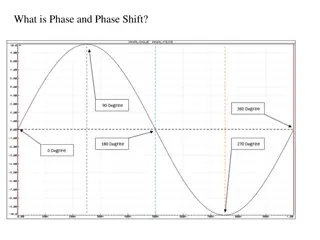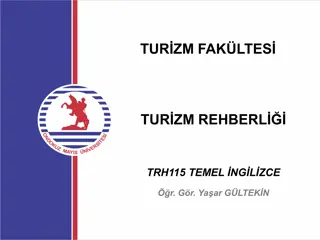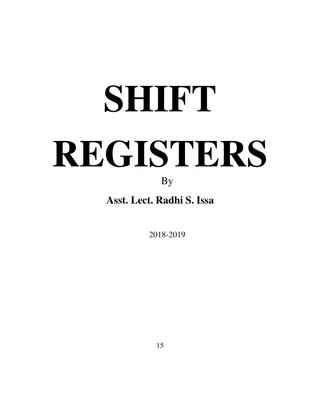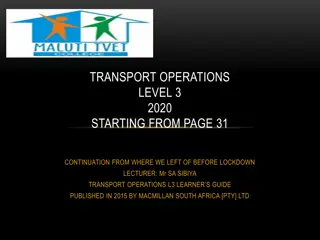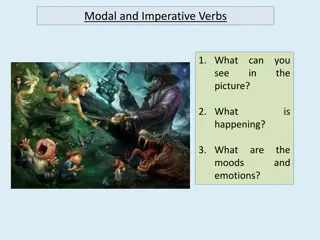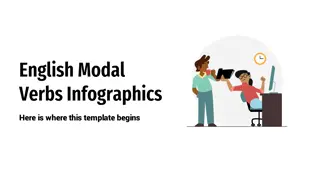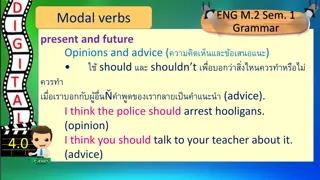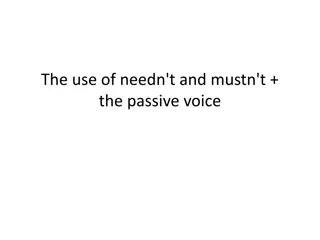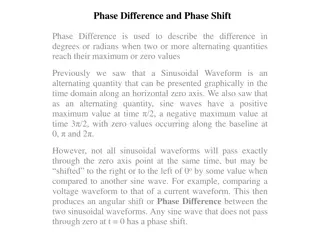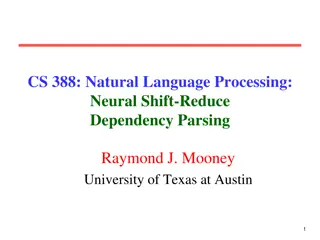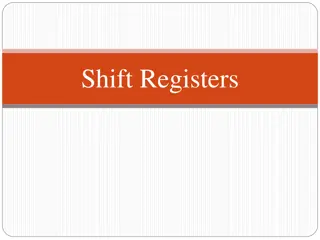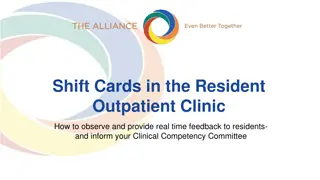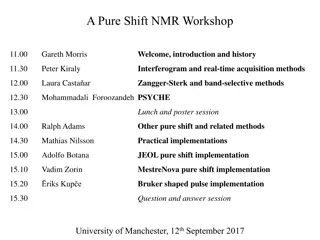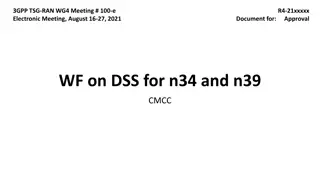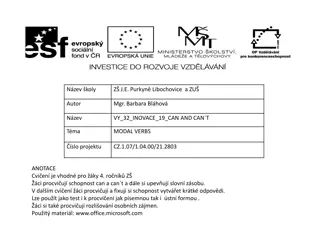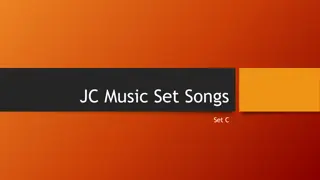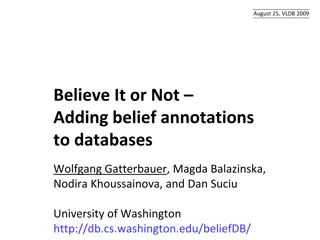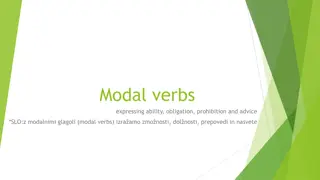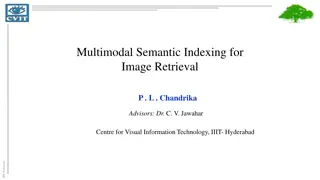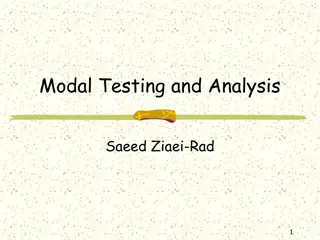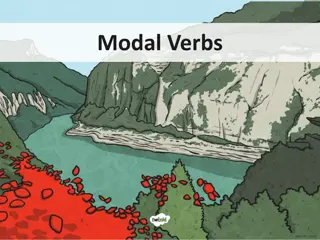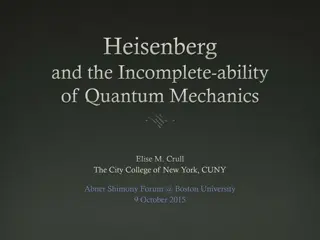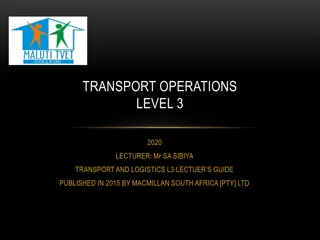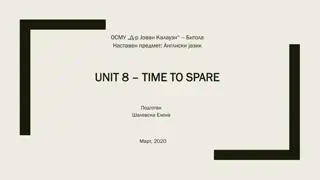Dos & Don'ts: Traffic Signs and Modal Verbs
Learn the meaning of traffic signs and practice using modal verbs in this English lesson. Improve your reading, listening, and writing skills.
8 views • 33 slides
MAKING RECOMMENDATIONS
Providing recommendations is a crucial skill in both spoken and written English, especially for tasks like formal essays, reports, proposals, and letters. This guide covers different ways to give recommendations using modal verbs, passive voice, gerunds, and more. Get insights on modal/semi-modal ve
5 views • 16 slides
The Shift from Government to Governance
This presentation discusses the transition from government to governance in public administration, exploring the concepts of public governance and the shift in decision-making processes. It covers the definition of public governance, the key differences between government and governance, and the imp
0 views • 8 slides
Understanding RC Phase Shift Oscillators
Dive into the world of RC phase shift oscillators, exploring the concepts of phase and phase shift in electronic circuits. Learn how cascading RC networks can achieve specific phase shifts, the role of impedance, and the practical applications of RC feedback networks in oscillator circuits. Discover
1 views • 18 slides
Pedagogical Shift in Physical Science: Constructing Knowledge Through Learner-Centered Experiences
There is a significant pedagogical shift in physical science education from viewing science as a fixed body of knowledge to emphasizing the process of constructing knowledge. Learners are now placed at the center stage, engaging in inquiry-based learning, critical thinking, and collaborative interac
3 views • 21 slides
Understanding Modal Verbs in English
Modal verbs, also known as modals, are auxiliary verbs that express attitudes and levels of certainty in English. They serve various purposes, such as indicating certainty, ability, permission, and making requests. Modal verbs like can, could, may, might, will, would, must, shall, should, and ought
0 views • 19 slides
Decarbonising Multimodal Logistic Chains: Best Practices Panel in Hamburg
Explore key discussions from the 13rdERA Multimodal conference Panel III in Hamburg focusing on decarbonising multimodal logistic chains. The panelists, including Nicolas Albrecht from Cargobeamer, Andr Düring from Alstom, and Matthias Knöpling from VTG, shared insights on shifting towards sustain
1 views • 6 slides
Understanding Modal Verbs: Epistemic and Deontic Uses
Modal verbs, such as can, could, may, must, will, and should, play a crucial role in expressing modality in English. This content discusses the epistemic and deontic uses of modal verbs, illustrating how they convey likelihood, ability, permission, suggestions, obligations, and advice. Explore the n
0 views • 34 slides
Shift of the Church: Eastward Expansion Through History
The Asian Church is witnessing a significant shift in influence from the West to the Majority World, marking a transformative phase in modern mission movements. With historical milestones like the Roman Catholic presence established in 1493 and the Protestant movement beginning in 1705 through figur
0 views • 12 slides
Understanding Shift Registers in Digital Electronics
Shift registers are a fundamental concept in digital electronics where binary numbers are shifted from one flip-flop to the next. They come in various types like SISO, SIPO, PISO, and PIPO, serving different purposes such as delay lines, data converters, sequential memory, and ring counters. The ope
0 views • 10 slides
Understanding Intermodal Transport Operations in Supply Chains
Explore the interrelationship of transportation services, multi-modalism, and safety legislation in the field of transport operations, referencing a comprehensive learner's guide. Topics covered include seamless supply chains, modal options, safety legislation, modal movement requirements, and more.
1 views • 14 slides
Understanding Modal and Imperative Verbs: Usage and Examples
This content covers the explanation and examples of modal verbs, which express certainty, possibility, and obligation, as well as imperative verbs that denote commands and orders. Learn to identify and use these verb types accurately and creatively through practical examples and engaging activities.
1 views • 12 slides
Benefits of Vocantas Mobile App and Online Portal
Explore the benefits of using the Vocantas Mobile App and Online Portal, including easy installation on mobile devices, managing notifications, shift filtering, bidding on future shifts, receiving notifications on shift awards, adding shifts to your calendar, and more. The Online Portal offers featu
0 views • 9 slides
Understanding English Modal Verbs: A Visual Guide
Explore the world of English modal verbs through engaging infographics covering must, can, may/might, could, and should. Learn about their usage in sentences and grasp the nuances of expressing ability, permission, obligation, and possibility. Dive into the explanations with visual aids depicting sc
0 views • 33 slides
Understanding Modal Verbs in English Grammar
Explore the nuances of modal verbs in English grammar through opinion, advice, and exercises. Learn how to use modal verbs like should, ought to, can, must, and may in present and future contexts. Enhance your language skills with examples and exercises highlighting the correct usage of modal verbs.
0 views • 12 slides
Effective Use of "Needn't" and "Mustn't" in Passive Voice
Understanding when to use "needn't" and "mustn't" in the passive voice can enhance your language skills. "Needn't" is used to express lack of necessity, while "mustn't" indicates prohibition or strong advice. Incorporating these modal verbs in the passive voice adds depth and clarity to your communi
0 views • 4 slides
Understanding Phase Difference and Phase Shift in Sinusoidal Waveforms
Phase difference and phase shift describe the angular displacement of sinusoidal waveforms in degrees or radians. These concepts are crucial in analyzing the relationship between alternating quantities such as voltage and current. The phase angle determines the shift of a waveform along the horizont
1 views • 26 slides
Neural Shift-Reduce Dependency Parsing in Natural Language Processing
This content explores the concept of Shift-Reduce Dependency Parsing in the context of Natural Language Processing. It describes how a Shift-Reduce Parser incrementally builds a parse without backtracking, maintaining a buffer of input words and a stack of constructed constituents. The process invol
0 views • 34 slides
Understanding Shift Registers in Sequential Logic Circuits
Shift registers are sequential logic circuits used for storing digital data. They consist of interconnected flip-flops that shift data in a controlled manner. This article explores different types of shift registers such as Serial In - Serial Out, Serial In - Parallel Out, Parallel In - Serial Out,
2 views • 9 slides
Enhancing Resident Observations with Shift Cards in Outpatient Clinic
Explore the utility of Shift Cards in providing real-time feedback to residents in the outpatient clinic setting. Learn how to observe, provide feedback, and engage with the Clinical Competency Committee effectively using this innovative tool. Discover the benefits, learning objectives, and audience
0 views • 16 slides
Simplifying Residency Shift Scheduling with Mathematical Programming Techniques
This project, led by Professor Amy Cohn and William Pozehl, aims to demonstrate how mathematical programming techniques can simplify the complex task of residency shift scheduling. The Residency Shift Scheduling Game highlights the challenges of manual scheduling and the ease of using mathematical p
1 views • 37 slides
The Great Vowel Shift: A Linguistic Evolution
The Great Vowel Shift was a significant phonological transformation in the English language during the 15th to 17th centuries that altered the pronunciation of long vowel sounds. This shift, marked by a movement of vowel sounds to higher and more forward positions in the mouth, shaped the transition
3 views • 11 slides
Managing Fatigue and Shift Work: Impact on Safety and Wellbeing
Understanding the legal requirements, effects of fatigue and shift work, and ways to manage fatigue is crucial for ensuring workplace safety and employee wellbeing. Fatigue, a state of reduced performance capability, can result from various factors, including sleep loss and workload. Shift work pose
6 views • 19 slides
Pure Shift NMR Workshop: Advancements and Insights
Explore the latest developments and insights in Pure Shift NMR spectroscopy through presentations on acquisition methods, implementations, and the quest for spectral purity. Discover the evolution of magnet development and the potential of high-temperature superconductivity in NMR technology. Delve
2 views • 27 slides
Discussion on UL 7.5kHz Frequency Shift for n34 and n39 in 3GPP TSG-RAN WG4 Meeting #100-e
The approval document for Working Group on Dual-Site Selection (DSS) for n34 and n39 in CMCC, discussed in the 3GPP TSG-RAN WG4 Meeting #100-e, addresses the UL 7.5kHz shift agreements for different releases. The document outlines the mandatory nature of the shift for n34 and n39 in later releases,
3 views • 4 slides
Modal Verbs Exercise - Can and Can't Practice Activities
Enhance students' ability to use modal verbs can and can't through engaging exercises focusing on forming questions and short answers. Utilize the provided images to prompt students to complete sentences and questions with appropriate modal verbs.
0 views • 5 slides
Overview of Sacred Music: Plainchant, Gregorian Chant, and Modal Music
Delve into the world of sacred music with a focus on Plainchant, Gregorian Chant, and Modal Music. Explore the history, characteristics, and unique features of these musical forms, ranging from the reverent tones of Salve Regina to the intriguing melodies of Modal Music. Discover the textures, moods
0 views • 10 slides
Managing Belief Annotations in Databases: A Modal Logic Approach
Explore the concept of belief databases that enable data curation based on modal and default logic in a relational model. The work discusses managing inconsistent views in community databases and presents a motivating application scenario to illustrate the challenges and solutions in handling belief
0 views • 34 slides
Understanding Modal Verbs for Ability, Obligation, Prohibition, and Advice
Modal verbs play a crucial role in expressing ability, obligation, prohibition, and advice in English. They help convey various nuances in meaning such as capability, necessity, restrictions, and suggestions. By exploring modal verbs like "can", "could", "must", and others, you can develop a deeper
0 views • 9 slides
Power System Dynamics and Stability: Modal Analysis and PSSs
This lecture discusses modal analysis and Power System Stabilizers (PSSs) in power system dynamics and stability, covering topics such as eigenvalue calculations, generator models, and exciter effects. Key papers and examples are provided to enhance understanding and application in power systems eng
0 views • 27 slides
Multimodal Semantic Indexing for Image Retrieval at IIIT Hyderabad
This research delves into multimodal semantic indexing methods for image retrieval, focusing on extending Latent Semantic Indexing (LSI) and probabilistic LSI to a multi-modal setting. Contributions include the refinement of graph models and partitioning algorithms to enhance image retrieval from tr
1 views • 28 slides
Understanding Modal Verbs in Grammar - Mega Goals 6 Unit 1 Everyone Makes Mistakes
Modal verbs play a crucial role in expressing abilities, possibilities, and obligations in English grammar. This lesson from Mega Goals 6 Unit 1 covers modal verbs, passive voice, and past models, offering a comprehensive overview through various activities and examples.
0 views • 25 slides
Understanding Modal Testing and Analysis in Structural Dynamics
Modal testing and analysis play a crucial role in understanding the behavior of structural systems under various conditions like undamped, viscously damped, and hysterically damped scenarios. This analysis involves the study of single-degree-of-freedom systems, undamped systems for free and forced v
0 views • 23 slides
Understanding Modal Verbs: Usage and Examples
Modal verbs are auxiliary verbs that are used in conjunction with main verbs to express various meanings such as possibility, likelihood, necessity, and more. Common modal verbs include may, must, could, should, and will. They play a crucial role in indicating the level of certainty or permission in
0 views • 16 slides
Understanding Modal Verbs in English
Modal verbs in English such as 'must', 'have to', 'mustn't', and 'don't have to' are used to express obligations, prohibitions, and lack of necessity. 'Must' and 'have to' convey internal and external obligations, while 'mustn't' indicates prohibition and 'don't have to' implies lack of necessity. E
0 views • 14 slides
Encouraging Shift to Rail for Sustainable Travel
Explore strategies and insights on encouraging a modal shift to rail transport for a more sustainable travel future. Join industry experts at the GBTA Sustainability Summit to discuss modal share, market trends, and the role of high-speed rail in reducing emissions. Learn about sustainability, multi
0 views • 6 slides
Heisenberg and the Incomplete Ability of Quantum Mechanics
A nuanced exploration of Heisenberg's role in the history of Modal Interpretations, revealing how he anticipates MIs. Discussions include contemporary views, Dieks' explanations on modal interpretations, and Heisenberg's stance on quantum propensities. The presentation emphasizes the transition from
0 views • 14 slides
Future Investments in European Rail Freight Transport
European Rail Freight Association (ERFA) focuses on future developments and investments in European rail freight transport to improve competitiveness by reducing costs, enhancing quality and performance, and addressing access barriers. Key challenges include track access charges and the need for tra
0 views • 22 slides
Understanding Multi-Modal Transportation in Logistics
The content covers concepts such as inter-modal and multi-modal transportation, seamless supply chains, standard containers, swap bodies, cellular container ships, and unaccompanied road semi-trailers in the context of transportation operations. It explains the meanings and functions of various mode
0 views • 14 slides
Effective Language Learning: Vocabulary, Grammar, and Modal Verbs Activities
Enhance your language skills with engaging vocabulary exercises, definitions matching, and practice with modal verbs. Dive into a variety of educational tools, improve your understanding with video explanations and PDFs, and master different types of present modal verbs. Elevate your language learni
0 views • 16 slides



